Related Research Articles

Patsy Cline was an American singer from the state of Virginia. She is considered one of the most influential vocalists of the 20th century and was one of the first country music artists to cross over into pop music. Cline had several major hits during her eight-year recording career, including two number-one hits on the Billboard Hot Country and Western Sides chart.
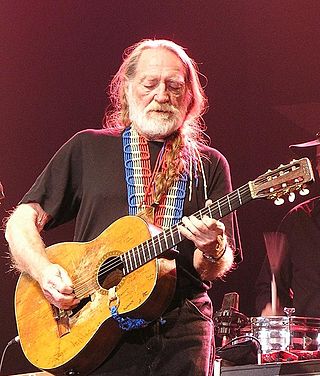
Willie Hugh Nelson is an American country singer, guitarist and songwriter. He was one of the main figures of the outlaw country subgenre that developed in the late 1960s as a reaction to the conservative restrictions of the Nashville sound. The critical success of his album Shotgun Willie (1973), combined with the critical and commercial success of Red Headed Stranger (1975) and Stardust (1978), made Nelson one of the most recognized artists in country music. Nelson has acted in over 30 films, co-authored several books, and has been involved in activism for the use of biofuels and the legalization of marijuana.
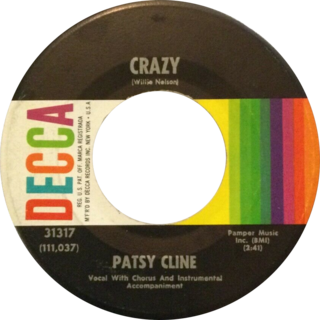
"Crazy" is a song written by Willie Nelson and popularized by country singer Patsy Cline in 1961. Nelson wrote the song while living in Houston, working for Pappy Daily's label D Records. He was also a radio DJ and performed in clubs. Nelson then moved to Nashville, Tennessee, working as a writer for Pamper Music. Through Hank Cochran, the song reached Patsy Cline. After her original recording and release, Cline's version reached number two on Billboard's Hot Country Singles, also crossing to the pop chart as a top 10 single.

Shotgun Willie is the 16th studio album by American country music singer-songwriter Willie Nelson, released on June 11, 1973. The recording marks a change of style for Nelson, who later stated that the album "cleared his throat". When Nelson refused to sign an early extension of his contract with RCA Records in 1972, the label decided not to release any further recordings. Nelson hired Neil Reshen as his manager, and while Reshen negotiated with RCA, Nelson moved to Austin, Texas, where the ongoing hippie music scene at the Armadillo World Headquarters renewed his musical style. In Nashville, Nelson met producer Jerry Wexler, vice president of Atlantic Records, who was interested in his music. Reshen solved the problems with RCA and signed Nelson with Atlantic as their first country music artist.
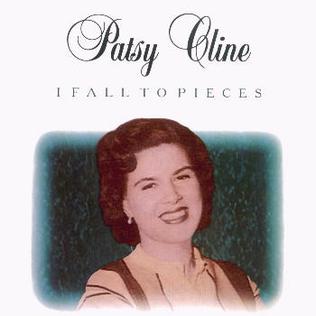
"I Fall to Pieces" is a song written by Hank Cochran and Harlan Howard that was originally recorded by Patsy Cline. Released as a single in 1961 via Decca Records, it topped the country charts, crossed over onto the pop charts and became among Cline's biggest hits. Cline was initially reluctant to record "I Fall to Pieces" and believed its production lacked enough country instrumentation for her liking. Eventually, Cline recorded the song upon the encouragement of her producer.

Edwin A. "Bud" Shrake, Jr. was an American journalist, sportswriter, novelist, biographer and screenwriter. He co-wrote a series of golfing advice books with golf coach Harvey Penick, including Harvey Penick's Little Red Book, a golf guide that became the best-selling sports book in publishing history. Called a “lion of Texas letters” by the Austin American-Statesman, Shrake was a member of the Texas Film Hall of Fame, and received the Lon Tinkle lifetime achievement award from the Texas Institute of Letters and the Texas Book Festival Bookend Award.

Both Sides Now is the tenth studio album by country singer Willie Nelson, released in 1970.

The Party's Over and Other Great Willie Nelson Songs is the sixth studio album by country singer Willie Nelson.

Country Willie: His Own Songs is the third studio album by country singer Willie Nelson. This was Nelson's third album, his first for RCA Victor.

...And Then I Wrote is the debut studio album by country singer Willie Nelson, recorded during August and September 1962 and released through Liberty Records.

Tootsie's Orchid Lounge is a honky-tonk bar located on Lower Broadway in Nashville, Tennessee behind the Ryman Auditorium, home in past years and occasionally in the present to the stage and radio show The Grand Ole Opry. Tootsie's has three stages that host live local talent each night, covering modern-day country music artists such as Jason Aldean, Taylor Swift, and other performers, as well as original work.

The Family is the lead singer Willie Nelson's touring and recording group. Nelson, who did not manage through the 1960s to succeed as a singer, retired after the failure of his 1971 album Yesterday's Wine. The following year, he returned from retirement rejuvenated by the burgeoning music movement of Austin, Texas.

"Night Life" is a song written by country music singer-songwriter Willie Nelson. Nelson was inspired to write the song during one of his trips from his home in Pasadena, Texas, to his work, singing at the Esquire Ballroom in Houston.
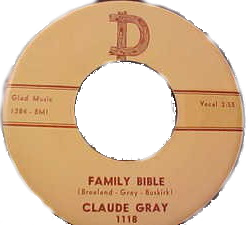
"Family Bible" is a song written by country music singer-songwriter Willie Nelson. Nelson began writing the song in 1957, while he enjoyed success as a disc jockey in KVAN, in Vancouver, Washington. After being denied a raise by the station, he moved to Houston, Texas. Due to financial issues he sold the song to Paul Buskirk.

"Mr. Record Man" is a song written by country music singer-songwriter Willie Nelson. After writing the song, Nelson moved to Houston, Texas, where due to his financial issues, tried to sell it to Larry Butler. Butler, who rejected to buy the song, employed Nelson instead. After his original songs turned into hits for other artists, Nelson was signed as a recording artist by Liberty Records.
"The Storm Has Just Begun" is a song by country music singer-songwriter Willie Nelson. Nelson wrote the song at the age of twelve. While working for KBOP in Pleasanton, Texas, in 1955, the song was one of the first two ever recorded by Nelson.

"Willingly" is a duet by American country music singer Willie Nelson and Shirley Collie, produced by Joe Allison during Nelson's third session for Liberty Records. Released in March 1962, the album reached number ten on Billboard's Hot Country Singles.
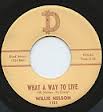
"What a Way to Live" is a song written by country music singer Willie Nelson. He recorded the song on his second session with D Records, after moving to Houston, Texas. Produced by Bill Quinn, it was cut at Gold Star Studios in March 1960.

"The Party's Over" is a song written and recorded by American country music singer Willie Nelson during the mid-1950s. After arriving in Houston, Texas, Nelson was hired to play for the Esquire Ballroom band, where he would be allowed to close the shows singing the song. Guitar instructor and Nelson's friend Paul Buskirk forwarded the song to singer Claude Gray, who recorded the original version of the song, released as "My Party's Over" in 1959.
Brazos River Bottom, also known as the BRB, was a gay bar located in the Midtown, Houston, Texas, United States, that opened in 1978. At the time of its closure in 2013, it was one of Houston's oldest gay bars, and the oldest still running at its original location.
References
- ↑ "The Esquire Ballroom History". Neon Boots. Retrieved November 11, 2013.
- ↑ "Kick up those heels at Neon Boots gay bar". The Houston Chronicle. 21 August 2013. Retrieved November 11, 2013.
- ↑ "Neon Boots takes off where Esquire Ballroom left off". The Houston Chronicle. 23 August 2013. Retrieved November 11, 2013.
- ↑ "Neon Boots, Texas' Biggest Country LGBT Bar, is Open for Business". The Houston Press. Retrieved November 11, 2013.
- ↑ "Texas-Sized Gay Bar Neon Boots Saddles Up In Houston". LOGO TV. Retrieved November 11, 2013.
- ↑ "Tight Jeans, Belt Buckles, and Rhinestones Dazzled 'Neon Boot' Preview Party Last Night". About Magazine. Archived from the original on November 11, 2013. Retrieved November 11, 2013.
- ↑ "The largest gay bar in Texas is roaring into Houston: And you'd better bring your cowboy boots". CultureMap Houston. Retrieved November 11, 2013.
- ↑ "Neon Boots kicks up its heels at historic venue". The Houston Chronicle. Retrieved November 11, 2013.
- ↑ "Dust Off Your Hat and Boots!". Outsmart Magazine. August 2013. Retrieved November 11, 2013.
- ↑ "Say Howdy to the Largest Gay Country Bar in Texas". Houston Swamplot. Retrieved November 11, 2013.
- ↑ "Times Change: From the Esquire Ballroom to Neon Boots". The Beaumont Enterprise. Retrieved November 11, 2013.
- ↑ "Neon Boots kicks up its heels at historic venue". The Houston Chronicle. Retrieved November 11, 2013.
- ↑ "Neon Boots, Texas' Biggest Country LGBT Bar, is Open for Business". The Houston Press. Retrieved November 11, 2013.
- ↑ "10 best dance halls where Texas country still swings". USA TOday. Retrieved April 24, 2014.
- ↑ Nelson, Willie; Shrake, Bud; Shrake, Edwin (2000). Willie: An Autobiography. Cooper Square Press. pp. 116, 117. ISBN 978-0-8154-1080-5.
- ↑ "Always... Patsy Cline". Always... Patsy Cline on Broadway. Retrieved November 11, 2013.
- ↑ "Stages' ALWAYS…PATSY CLINE Fabulously Spruces Up Show's 25th Anniversary". The Houston Chronicle. Retrieved November 11, 2013.